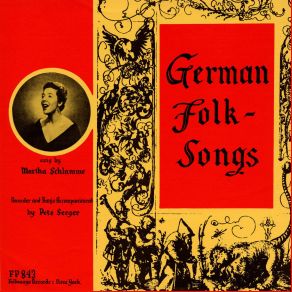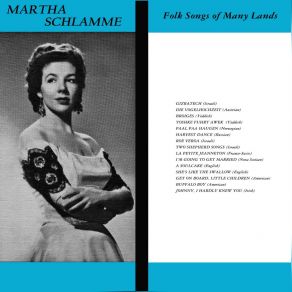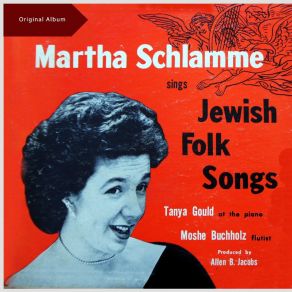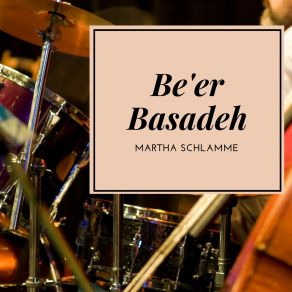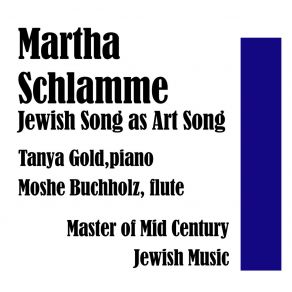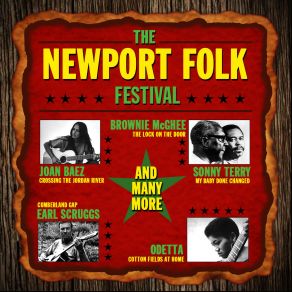Martha Schlamme
Wikimp3 information about the music of Martha Schlamme. On our website we have 7 albums and 2 collections of artist Martha Schlamme. You can find useful information and download songs of this artist. We also know that Martha Schlamme represents World Music genres.
Biography
[Edit]Martha Schlamme never set out to have an international career as a singer — the international part was forced on her by Adolph Hitler, and she brought the voice. Born Martha Haftel in 1922, she was the only daughter of Meier Haftel and the former Gisa Braten — her parents were Orthodox Jews, and her father owned a kosher restaurant in Vienna, where Martha grew up. At age 15, she was forced to leave Vienna with the forced annexation of Austria by Hitler's Germany, escaping through France to England. Her parents initially occupied an awkward, almost impossible legal netherworld in England — despite being refugees from Nazi persecution, as Austrian nationals they were legally enemy aliens, and were forced into an internment camp on the Isle of Man. Martha could have avoided this but instead took her place alongside them, and it was while in the internment camp that she met a fellow "enemy alien," Engel Lund, an Icelandic singer who took an interest in the girl's voice and sent her to teachers who could help her develop this talent. From there on out, her course was set. Once released from the camp, she was able to start singing, first in small venues and later on the BBC, and in various theaters in London. After the war, she studied the piano with Ferdinand Rauter and voice with Emmy Heim. In 1948, she married Hans Schlamme and the couple later emigrated to America.
In contrast to Europe's surviving Jewish community, a fraction of its former size after the Holocaust, which was dislocated and even largely homeless, America's Jewish community was thriving and vibrant. Schlamme found an audience for her singing and her chosen repertory, traditional songs in Hebrew and Yiddish, and she began her concert career in the Catskills, even as she maintained her belated musical education with Marinka Gurewich and Hans Heinz, and the legendary Jennie Tourel. It was through the latter that she met Olga Ryss, who became her singing coach. By the early '50s, Schlamme was singing before college audiences and in nightclubs, including such august venues as New York's Town Hall and the Village Gate, and the Wilshire-Ebell Theater in Los Angeles, and performing on the radio. Schlamme also began recording, initially for Folkways Records, where her work included an important step back to her roots. For years, during and after World War II, Schlamme, like many other refugees from the Nazis, avoided any contact with German culture, including the music, and in a repertory that had grown to hundreds of songs by the early '50s, German folk songs were notably (but understandably) absent. For Folkways, however, in collaboration with Pete Seeger (by then America's most popular blacklistee, whom most record labels wouldn't have gone near at the time), she recorded German Folk-Songs (1954) — with Seeger playing the accompaniment on banjo and recorder; those dozen songs marked her reconciliation with at least a piece of German musical culture. By the '60s, she had recorded songs in a dozen languages — and had found acceptance across the entire range of audiences — and had given over 1000 concerts in the USA alone, although her widest recognition and the core of her repertory remained her work with Jewish songs. She recorded for Vanguard, Columbia, and MGM, and was also known for her pioneering interpretations of the songs of Kurt Weill, whose music she'd been doing since the '40s. During the '60s, she recorded two complete LPs of his work, The World of Kurt Weill in Song (1962) and A Kurt Weill Cabaret (1963), and in 1965 Schlamme starred in a production of Weill's, Mahagonny, at the Strafford Festival in Ontario and two years later she collaborated with Alvin Epstein at the Ravinia Music Festival in A Kurt Weill Cabaret. And for U.S. release of the 1963 movie version of Threepenny Opera, Schlamme dubbed the voice of Hildegard Neff. She came to Broadway in 1968, in the role of Golde in Fiddler on the Roof, and later performed in her own one-woman show, A Woman Without a Man Is.... She also became noted as a music and acting teacher, and for her involvement with leftist politics. Schlamme divorced her first husband during the '60s and later married activist lawyer Mark Lane. Her career came to a tragic end when she suffered a stroke while on-stage performing. She passed away in 1985 at age 63.
Title: Tikva Lives!, Vol. 9: Jewish Folk Songs
Artist: Martha Schlamme
Genre: World Music, Songwriter/Lyricist, Folk
Collections
Title: The Newport Folk Festival
Genre: Songwriter/Lyricist
Title: Toward World Understanding With Song
Genre: World Music
